Podcast
Questions and Answers
Who is the author of 'Discrete Mathematics and Its Applications'?
Who is the author of 'Discrete Mathematics and Its Applications'?
Kenneth H. Rosen
What edition of 'Discrete Mathematics and Its Applications' is mentioned?
What edition of 'Discrete Mathematics and Its Applications' is mentioned?
- Fifth Edition
- Eighth Edition
- Sixth Edition
- Seventh Edition (correct)
The textbook was published by McGraw-Hill.
The textbook was published by McGraw-Hill.
True (A)
What notable change does the seventh edition reflect?
What notable change does the seventh edition reflect?
What type of art is featured on the cover of the seventh edition?
What type of art is featured on the cover of the seventh edition?
Where was Kenneth H. Rosen formerly employed?
Where was Kenneth H. Rosen formerly employed?
What is a set?
What is a set?
How can a set be described using the roster method?
How can a set be described using the roster method?
What does the set O = {1, 3, 5, 7, 9} represent?
What does the set O = {1, 3, 5, 7, 9} represent?
What is set builder notation?
What is set builder notation?
Sets can have other sets as members.
Sets can have other sets as members.
Which of the following sets is not a type of number set?
Which of the following sets is not a type of number set?
The set of natural numbers is denoted by ______.
The set of natural numbers is denoted by ______.
The notation [a, b] represents a ______ interval.
The notation [a, b] represents a ______ interval.
Match the sets with their description:
Match the sets with their description:
Study Notes
Seventh Edition
- Kenneth Rosen wrote Discrete Mathematics and Its Applications
- This edition is a substantial revision of the previous six editions
- The seventh edition includes extensive feedback from professors, students, and more than 50 reviewers
- The edits were also reflective of the author’s experience in industry and academia
Key Benefits
- The book is the most widely used textbook in its field
Set Definition
- A set is an unordered collection of objects, called elements or members.
- Elements can be listed using braces and the roster method, e.g., {a, b, c, d}.
- Ellipses (...) are used when the pattern of elements is obvious, e.g., {1, 2, 3, ..., 99}
- Set builder notation describes elements by their properties, e.g., {x | x is an odd positive integer less than 10}.
Important Sets in Discrete Mathematics
- N = {0, 1, 2, 3,...}, the set of natural numbers
- Z = {...,−2,−1, 0, 1, 2,...}, the set of integers
- Z+ = {1, 2, 3,...}, the set of positive integers
- Q = {p/q | p ∈ Z, q ∈ Z, and q = 0}, the set of rational numbers
- R, the set of real numbers
- R+, the set of positive real numbers
- C, the set of complex numbers
Intervals of Real Numbers
- [a, b] = {x | a ≤ x ≤ b}, closed interval from a to b
- [a, b) = {x | a ≤ x < b}, semi-closed interval from a to b
- (a, b] = {x |a < x ≤ b}, semi-closed interval from a to b
- (a, b) = {x |a < x < b}, open interval from a to b
Sets as Elements
- Sets can contain other sets as members.
Datatypes and Sets in Computer Science
- The concept of a datatype or type is built upon sets.
- A datatype is the name of a set along with operations performed on its elements.
- Boolean is the set {0, 1} with operators AND, OR, and NOT.
Studying That Suits You
Use AI to generate personalized quizzes and flashcards to suit your learning preferences.
Related Documents
Description
Discover the key features and updates in Kenneth Rosen's widely used textbook, 'Discrete Mathematics and Its Applications,' now in its seventh edition. This edition incorporates substantial revisions based on feedback from an extensive network of reviewers and reflects the author's broad experience in both academia and industry.




